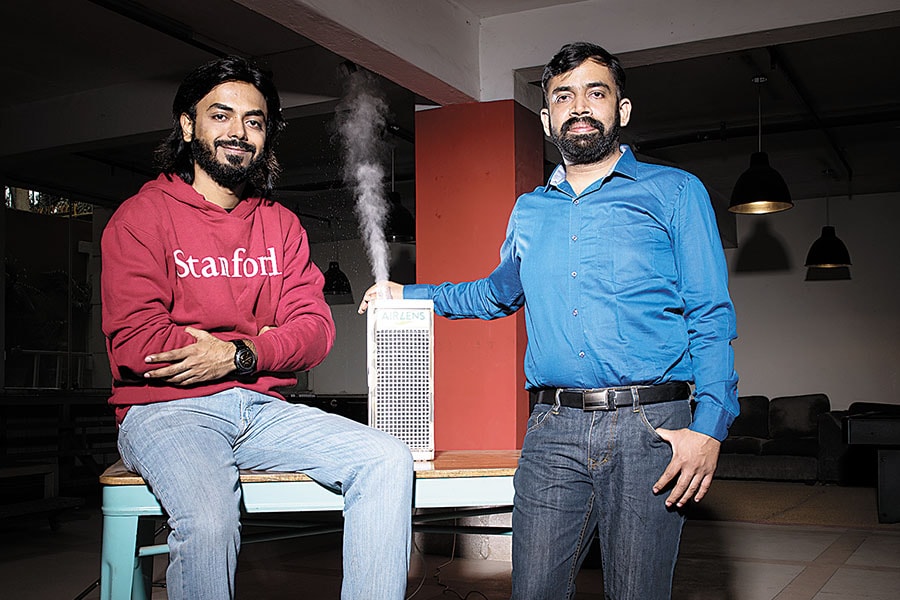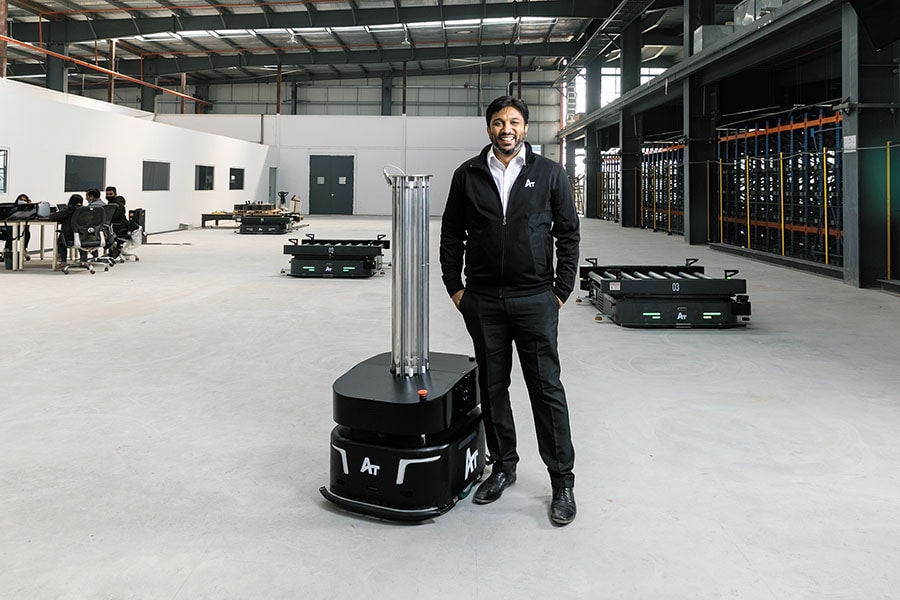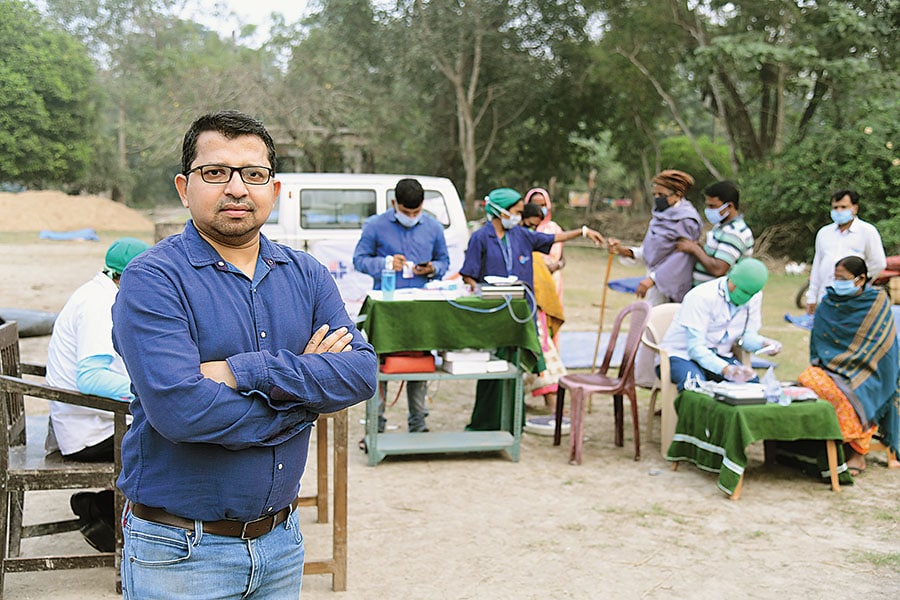Innovation during Covid-19: Tech tonic for health care startups
Health care startups and other companies are making the most of the pandemic-induced opportunities in the sector by developing innovative products and technologies


 Debayan Saha and Shashi Rajan, co-founders of PerSapien
Debayan Saha and Shashi Rajan, co-founders of PerSapien
Image: Amit Verma[br] The coronavirus outbreak exposed the vast gaps, severe inadequacies and existing vulnerabilities in the Indian health care system. As of August, there was only one government bed and one doctor for every 1,844 and 11,082 patients, respectively. The country is ranked 145 among 195 countries in terms of quality and accessibility of health care, according to a Lancet study.
The challenges, however, also proved to be a great opportunity for health care startups and others who pivoted into the sector. From launching a range of sanitisers and masks, and health care assistive applications to manufacturing ventilators, personal protective equipment kits and experimenting with various Covid-19 tests, the sector saw hectic activity since March. Issues such as labour scarcity and supply chains breaking down persisted, but did not prove to be a deterrence for companies willing to establish themselves.
According to DataLabs by Inc42+’s ‘India’s Healthtech Landscape In A Post-Covid-19 World Report 2020’, the size of the healthtech market in India is likely to touch $21 billion by 2025 from $5.2 billion in 2019.
Forbes India takes a look at a few such startups that are taking the fight against Covid-19 head-on.
PerSapien: Water Way To Kill The Virus
Two years after Shashi Rajan and Debayan Saha met at Stanford University as Global Biodesign fellows in 2015, they launched PerSapien in India to develop technologies to tackle air pollution. Since 2017, the company has launched three products, with a couple of patents to its name and a few others in the pipeline. However, just when things appeared to fall in place, demand for PerSapien’s products took a hit because of the pandemic. “We realised it was time to go back to the brainstorming board and understand the entire pandemic landscape,” says Rajan.
The duo realised that an effective vaccine and medicines would take time to hit the market. So, they decided to focus on the existing gap: Effective sanitisation technologies to control the spread of the virus. Though there are enough technologies available—like UV-C, Sodium Hypochlorite and Ozone—each one is hazardous to human health. “Hence, based on the research we have done in the past several years in ‘particulate physics’ while working on PM2.5, other pollutants and contaminants, we came across a way to destroy the coronavirus by scientifically exploiting the unique properties of water, namely ‘polar covalent bonds’,” says Saha.
The technology—Airlens Minus Corona—uses tap water and electricity to kill the virus. “Using the principles of fundamental physics, the unique properties of water are exploited to turn normal tap water into potent antiviral by activating electrical energy, which is dispersed in the form of microns or even smaller water mist particles which kill the virus,” explains Rajan, adding that the technology has been tested at the Indian Council of Medical Research and proved to be successful in inactivating and destroying virus.
As water is the key component, the device—developed in May—can be deployed in every nook and corner of the country. Currently, it has been installed in Narayana Hospital in West Bengal and GMR Airport, Hyderabad. The founders are also in talks with other hospitals and quarantine centres.
Before starting work on Minus Corona, Rajan and Saha developed a Minus Corona UV Bot in April to sterilise hospital corridors, wards, intensive care units (ICU) and patient rooms. “It was designed to break the transmission chain of Covid-19 in hospitals and other high infection areas. This automatic bot was controlled by an app to drive it through the entire facility without human intervention,” says Saha. “It would identify obstacles in the path, if any, turn around, reach the target location—Covid-19 wards or ICUs—and switch on the disinfection mode to kill or inactivate any virus or pathogen.” However, upon realising the disadvantages that come with the UV Bot, they did not launch this technology commercially.
But they are betting big on the Airlens Minus Corona. “Eventually we want to make our brand ‘Airlens’ the ubiquitous word for air protection from pandemic and pollution,” says Saha. Sangeet Kumar, CEO and co-founder, Addverb Technologies
Sangeet Kumar, CEO and co-founder, Addverb Technologies
Image: Madhu Kapparath[br] Addverb Technologies: Bots Clear Bottlenecks
Automation is the need of the hour, more than ever before. And innovation and disruption even more paramount in the health care sector. Realising this, Addverb Technologies—an end-to-end customised automation solution provider that has been working in this space for four years—has pivoted into the health care segment to assist frontline workers.
“We launched Decimator, a UV disinfectant robot that disinfects any area with the help of UV rays. They have been deployed in hospitals and quarantine centres,” says Sangeet Kumar, CEO and co-founder of Addverb Technologies. “With natural navigation capability and computer vision, Decimator moves from place to place and sprays UV rays across 360 degrees and automatically sprays disinfectant in indoor spaces too.” Apart from seeing encouraging demand in India, it has seen a few takers in the US and Southeast Asia as well.
The company—that clocked revenues of ₹113 crore in FY20—also customised Dynamo, its mobile robot which was earlier used in the warehouse sector, to cater to the health care segment. “The robot now ensures contactless movement and delivery of medicines, blood samples, imaging documents, surgical materials, linen bed sheets, uniform and meal trays to patients,” says Kumar.
The team has even developed a Screener Bot—equipped with thermal sensors and navigation technology—that moves around the reception area and checks the symptoms of visitors. “We also worked on real-time location system which provides an unprecedented opportunity for hospitals to revolutionise both the patient and visitor experience through improved operations by tracking the availability of beds and other critical equipment inside hospitals,” he explains.
Automation, however, remains the company’s core focus. “We are seeing unprecedented demand for warehouse automation (material handling automation) from all players across industries,” says Kumar. To maintain adequate social distancing—without losing on productivity—companies are now resorting to automation. According to Kumar, the pandemic has accelerated its adoption rate by 20 to 25 percent. The Noida-based company serves more than 75 customers, including Reliance, HUL, Marico, Flipkart, Pepsi, Ceat, Dabur and Asian Paints.
Addverb has raised a seed funding of $1 million and a Series A round of $10 million led by Jalaj Aswin Dani, promoter of Asian Paints. The company aims to generate revenue of ₹4,000 crore in three years, and penetrate into sectors such as education, hotels and airports. Sujay Santra, founder and CEO, iKure[br]iKure: Going the Last Mile
Sujay Santra, founder and CEO, iKure[br]iKure: Going the Last Mile
Sujay Santra, founder and CEO of iKure, is passionate about redressing the disparity between accessibility to quality health care in urban and rural India. Since its inception in 2010, the health care startup has focussed on delivering “last mile health care in India” by addressing challenges such as accessibility, affordability, availability, assurance and awareness. iKure delivers primary health care services through a network of clinics, digital technologies and trained frontline health workers.
“The increasing number of Covid-19 patients, along with other illnesses that are spreading, has overburdened the public health care systems, resulting in higher costs for both health care providers and seekers, and made it harder for the rural population to access health care. Due to the sudden nationwide lockdown, our ground operations came to a halt. Patients were unable to visit clinics. And we were unable to conduct outreach health camps,” explains Santra. To address the increased health care gap caused by the coronavirus, iKure has come up with technology-enabled health solutions as an immediate response strategy to fight the pandemic.
By using artificial intelligence and machine learning algorithm in its care delivery model, the startup has developed six applications that provide support to doctors, nurses, patients and other stakeholders for effective health care practices. Through its proprietary software, Wireless Health Incident Monitoring System or WHIMS, iKure analyses patient information for health screening, early detection and monitoring of diseases.
“Today, iKure caters to 10.2 million underserved people across seven states and has treated more than a million patients,” claims Santra, who was awarded the Ashoka Fellowship in 2016 and the ‘100 Most Impactful Healthcare Leader Award’ in 2019.
“Private organisations, researchers, philanthropists, non-profit organisations, and various state governments are increasingly collaborating with us on health and development. Through them, we aim to unlock new avenues and create health solutions that can work best for our beneficiaries. Going forward, we plan to open 190 hubs (health care clinics) across 10 states and help 50 million patients in three years,” he adds.
First Published: Dec 11, 2020, 12:19
Subscribe Now